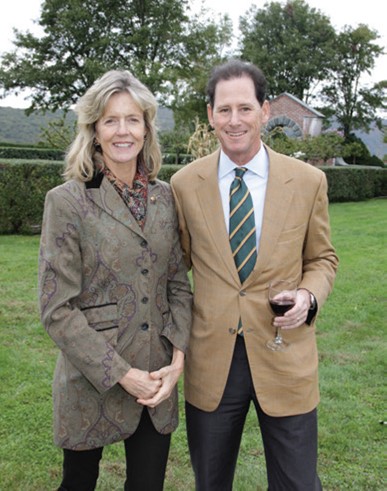 Growing up on his family’s 2,000-acre farm, Cotton Plant, outside of Memphis, Tennessee, Cook began hunting, fishing and exploring the woods at an early age. At seven years old, he began fox hunting with the Longreen Hunt (sometimes with an appearance by William Faulkner), and continued riding until he left for boarding school at Woodberry Forest. He matriculated to Dartmouth College, where he became deeply involved with the Dartmouth Outing Club, as well as picking up mountaineering, ice-climbing, rock-climbing and cross-country skiing. Upon graduating from the Tuck School of Business, he moved to New York in 1977 and got a job on Wall Street, working at a fixed income securities firm. He met his first wife, Karen, at a job interview at Goldman Sachs. He notes: “I didn’t get the job, but I got the girl!”
Growing up on his family’s 2,000-acre farm, Cotton Plant, outside of Memphis, Tennessee, Cook began hunting, fishing and exploring the woods at an early age. At seven years old, he began fox hunting with the Longreen Hunt (sometimes with an appearance by William Faulkner), and continued riding until he left for boarding school at Woodberry Forest. He matriculated to Dartmouth College, where he became deeply involved with the Dartmouth Outing Club, as well as picking up mountaineering, ice-climbing, rock-climbing and cross-country skiing. Upon graduating from the Tuck School of Business, he moved to New York in 1977 and got a job on Wall Street, working at a fixed income securities firm. He met his first wife, Karen, at a job interview at Goldman Sachs. He notes: “I didn’t get the job, but I got the girl!” The young couple rented a house in Southampton, Long Island, but Cook soon felt hemmed-in and longed for more expansive countryside. At his suggestion, the couple took a weekend trip to Dutchess County during the fall foliage season and stayed at the Altamont Inn. “I asked a fellow in the kitchen about all the horses and if there might be a hunt,” he remembers. Sure enough, the Millbrook Hunt was going out the next morning. Cook introduced himself to the master, Feli Thorne, and foot-followed that day. “It was all so inviting and familiar,” he says. “The members could not have been more gracious.” An invitation to the Hunt Ball followed that November and by December Karen gave Everett a new hunting kit for Christmas. The couple rented a house in Smithfield in 1979 and bought their first home in Smithfield Valley shortly after. Cook joined the Millbrook Hunt, where he would ultimately serve as a governor, as well as the treasurer. “For me, the Millbrook Hunt, with its lore and history, provides the DNA, lifeblood and sinews that create a common bond and keep conservation alive in our community,” he says.
By 1986, the couple had two young children and needed a house farther from the road. Three properties on Bangall-Amenia Road were for sale: the Cagney, the Sheldon, and the Van Benschoten Farms. A developer bought the Cagney Farm and optioned the Van Benschoten and Sheldon properties. “He ran into one problem: a Blanding’s turtle was discovered on the property and that is an endangered species,” Cook recalls. An action was brought against the developer by the community, which halted the project. The recession hit shortly after, wiping out the minimally- capitalized owner. Cook joined other conservation-minded individuals to form North Dutchess Properties, a company focused on buying and preserving land in the area. They raised the funds to purchase the 600-acre Cagney Farm, while Chauncey Stillman bought the 240-acre Sheldon Farm. Cook bought the 200-acre Van Benschoten Farm, now Box Turtle Farm, for his family. “I called it Box Turtle to memorialize the good deed that turtle did.”
Parallel to the efforts of North Dutchess Properties, the Dutchess Land Conservancy (DLC) was being formed, modeled after the Brandywine Conservancy in Pennsylvania. “I expressed my interest in land preservation to Farnham Collins, the DLC’s Vice Chairman, who asked me to join their initial meetings at Wethersfield,” he says. Cook went on to serve on the DLC board for 24 years. “North Dutchess operated separately, but with the financial firepower to buy properties and prevent them from being developed,” he explains. The group made several other successful acquisitions, placing the land in conservation with the DLC. Through the work of North Dutchess Properties, the DLC now protects 630 acres on the Bangall Amenia Road, 175 acres on Carpenter Hill, 260 acres on Route 83 and another key 20 acres on Route 44. “My family has always been deal-oriented. I picked up a lot working for my father when I was young and around the kitchen table,” Cook says. “Also, working with Tom Flexner in real estate taught me a great deal.” North Dutchess Properties was eventually dissolved, but the group continued their work on an ad-hoc basis.
When 200 acres was gifted to St. Peter’s Church in Lithgow, Cook presented neighbors with “an opportunity to stabilize the area.” Tacking together additional tracts of land to place under protection and finding a conservation-minded buyer for the St. Peter’s land, this neighborhood group preserved a total of 600 acres. When the Millbrook Equestrian Center was put up for sale, and the possible site of an intense development, Cook again worked with neighbors and friends to acquire various portions and place easements. In the end, 190-acres was protected, with one hundred acres being purchased by a group of more than 20 participants, who placed it under an easement and donated it to the Millbrook School. After Mashomack Preserve Club founder Dan Daly passed away, John Sprague approached Cook to become involved with the acquisition of the club by the members. (Cook would later serve as president for 6 years). Cook did so, but with the caveat that a separate and independent committee would be able to negotiate the conservation easement of the club’s 1,650 acres with the DLC, the largest in the organization’s history. “I have this passion to preserve land. Our farm in Memphis was cut up after we sold it to our neighbor. That really violated my sensibilities,” he says.
Cook also spearheaded advocacy work, including preventing the paving of the now historic Pugsley Hill Road through a well-placed article in The Millbrook Round Table. “We got a temporary restraining order as they were unloading equipment,” he says. “The asphalt was already hot.” He aided a legal team to stop a development on Route 83, proving the developer lacked proper access to the 200-acre property once owned by jazz legend, Artie Shaw (who memorialized his parties at the property with the song “Shekomeko Shake”).
Rosebrook, where the DLC Fall Luncheon will be held this October, provided the most recent preservation project for Cook. Roseland Ranch, as it was called, was a 600-acre dude ranch on Hunns Lake Road in Stanford. When the owner decided to retire, the entire property (with its approximately 50 rooms, 100 horses, ski-slope, tennis courts, ATVs and snowmobiles) went on the market. The property almost became a substance abuse clinic and another developer had plans for a residential buildup in excess of 100 homes. “I stepped in and made it very simple for them and bought it outright with an environmentally clean title,” he says. “I tore everything down, reclaimed the gravel mine and restored it back to its natural state. I had intended to live there myself, but then Helen came along,” he says, smiling towards the kitchen where his wife Helen has started to prepare dinner. Instead, Cook married Helen and moved in with her at Rocky Reef Farm and Rosebrook is currently on the market with hunting easements in place and conservation easements approved by the DLC board for a prospective buyer. “This area captures so many of the dimensions of my happy childhood and adolescent years. Hunting and horses are a big part of it along with farming and the simple splendors of nature,” he concludes.
“Don’t ever send a man to get produce,” Helen teases, holding up a bunch of limp carrots, when we walk through the kitchen to the front door. Cook helps me with my jacket, walks me out in the rain and opens my car door for me with his effortless Southern gentility. Driving away, I think of Character of the Happy Warrior, a poem by William Wordsworth:
It is the generous spirit, who, when brought
Among the tasks of real life, hath wrought
Upon the plan that pleased his boyish thought:
Whose high endeavors are an inward light
That makes the path before him always bright.
Surely, the rural character of Dutchess County benefits from Cook’s happy warrior crusade born out of childhood delights.











